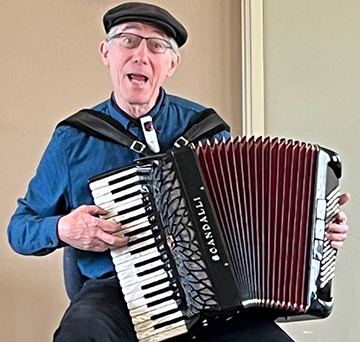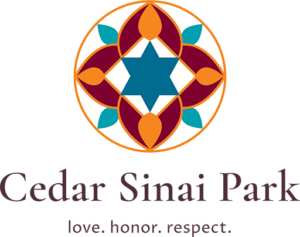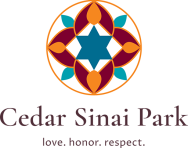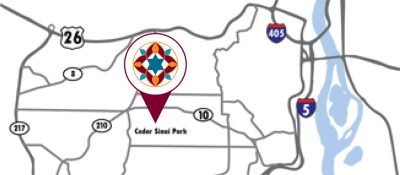Volunteer Brings Joy to Residents Through Music

Watching our slender volunteer Alan Moses lug his 21-pound accordion through the halls of Cedar Sinai Park to then set it on his knee for a playing and singing session with the residents is truly a lesson in dedication.
“It still feels like I’m wrestling an octopus every time I strap this thing on,” said the self-deprecating Alan, with a chuckle, as he nibbled an apple between gigs at our Home. “I found some great videos on accordion ergonomics,
Watching our slender volunteer Alan Moses lug his 21-pound accordion through the halls of Cedar Sinai Park to then set it on his knee for a playing and singing session with the residents is truly a lesson in dedication.
“It still feels like I’m wrestling an octopus every time I strap this thing on,” said the self-deprecating Alan, with a chuckle, as he nibbled an apple between gigs at our Home. “I found some great videos on accordion ergonomics, and I’m working my technique, but I think the main thing is just not to play too many hours in one day.”
Alan is typically at Cedar Sinai Park once or twice a week, in between playing for a hospice group, and helping to care for his pre-teen grandchildren.
“Knowing viscerally that you have made a difference in a person’s life is a great experience,” said Alan. “I knew as soon as I retired that I wanted to find an avenue to give back.
“I like to envision myself as helping, but it’s such a great feeling for me; it just feels good to do.”
This National Volunteer Week, please thank our beloved Cedar Sinai Park volunteers, like Alan, who help us daily with the care and support of residents.
Alan grew up in the Santa Barbara area in a musical family, and learned to play the piano as a child, participating in bands and other group settings. As a young parent attending camping festivals, he was frustrated that his given instrument was not portable and that he couldn’t participate. Then in the early 1990s, his wife Nancy Friedland found him an accordion.
“The right hand of the accordion is similar to the piano,” said Alan. “The biggest difference is that the accordion is a wind instrument. So, if you run out of breath in the bellows, it doesn’t make any noise. So that took me a while to get my head around. And then the left-hand buttons are quite different than anything I’d ever used.
“My right hand feels at home, and my left hand feels lost. It’s kind of an interesting challenge. I still feel like a bit of a duffer.”
Alan’s audiences certainly don’t agree with that assessment. “Oooohhh, I love that song,” said Ruby, as Alan charges into a rousing verse of Yankee Doodle Dandy.
“The accordion looks funny,” said Alan. “It puts people at ease.”
Alan and Nancy used to perform at senior centers in California (Nancy plays the mandolin). The couple moved to Portland in 2014 with the birth of their second grandchild. Both retired—Alan said he was in “middle management at a university”—he began volunteering as a musical companion for bedside visits to a hospice organization.
“My mother moved at the same time we did. She said ‘you can run, but you can’t hide!’ Eager for a change since Alan’s father had died a handful of years previously, Marilyn Moses called Rose Schnitzer Manor on her own and made a reservation for a guest visit. After two weeks, she said, ‘do I have to go back?’”
Marilyn lived at Rose Schnitzer Manor from 2014 to mid-2020 when she unexpectedly had a stroke.
She loved the place, the quality of care she got from everyone,” said Alan. “This place does an incredible job of staffing so she had a last good phase of her life while she was here. I am just so impressed with this organization.”
After Marilyn passed, Alan began volunteering for Nancy Heckler Adult Day Services Director on the Robison side of campus, and he has steadily bumped up his volunteer time ever since.
“It’s not performance; it’s about getting everyone to participate and comfortable with the singing, and the chatting in between,” said Alan.
“Being able to bring music to people in various times of their life is very gratifying. The benefits of music become really visible.
“When my wife’s dad was in cognitive decline, we would play for him. He was no longer able to remember Nancy’s name, but he could recall every word of the folk songs. We were able to see how much the music brought to him. At a time when he was confused, he could sing a song and feel competent.
“I learned a lot of the songs from my parents,” added Alan, “so there’s a feeling of connection there with my family, too.
“I feel connected to this place, as well. It’s one of the things that keeps me coming every week.”


